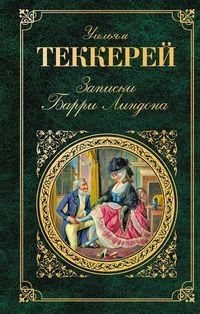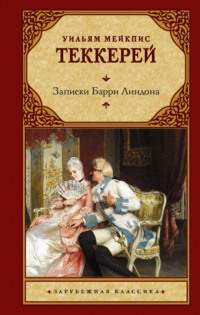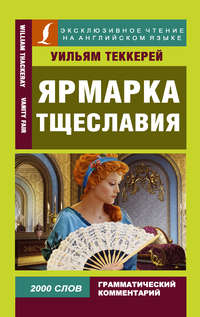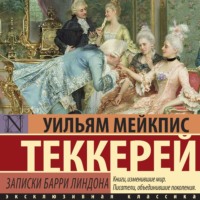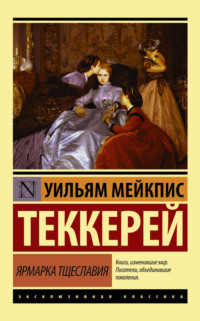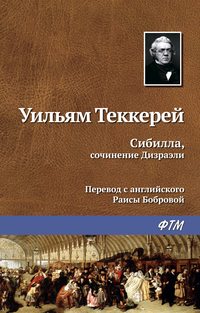 полная версия
полная версияA History of Pendennis. Volume 1. His fortunes and misfortunes, his friends and his greatest enemy
The major asked the fifth-form boy to carry his card up to the doctor, which the lad did with an arch look. Major Pendennis had written on the card, "I must take A. P. home; his father is very ill."
As the doctor received the card, and stopped his harangue with rather a scared look, the laughter of the boys, half constrained until then, burst out in a general shout. "Silence!" roared out the doctor, stamping with his foot. Pen looked up and saw who was his deliverer; the major beckoned to him gravely with one of his white gloves, and tumbling down his books, Pen went across.
The doctor took out his watch. It was two minutes to one. "We will take the Juvenal at afternoon school," he said, nodding to the major, and all the boys, understanding the signal, gathered up their books and poured out of the hall.
Young Pen saw by his uncle's face that something had happened at home. "Is there any thing the matter with – my mother?" he said. He could hardly speak, though, for emotion, and the tears which were ready to start.
"No," said the major, "but your father's very ill. Go and pack your trunk directly; I have got a post-chaise at the gate."
Pen went off quickly to his boarding-house to do as his uncle bade him; and the doctor, now left alone in the school-room, came out to shake hands with his old schoolfellow. You would not have thought it was the same man. As Cinderella at a particular hour became, from a blazing and magnificent princess, quite an ordinary little maid in a gray petticoat, so, as the clock struck one, all the thundering majesty and awful wrath of the schoolmaster disappeared.
"There is nothing serious, I hope," said the doctor. "It is a pity to take the boy away unless there is. He is a very good boy, rather idle and unenergetic, but he is a very honest, gentlemanlike little fellow, though I can't get him to construe as I wish. Won't you come in and have some luncheon? My wife will be very happy to see you."
But Major Pendennis declined the luncheon. He said his brother was very ill, had had a fit the day before, and it was a great question if they should see him alive.
"There's no other son, is there?" said the doctor. The major answered "No."
"And there's a good eh – a good eh – property I believe?" asked the other, in an offhand way.
"H'm – so so," said the major. Whereupon this colloquy came to an end. And Arthur Pendennis got into the post-chaise with his uncle never to come back to school any more.
As the chaise drove through Clavering, the hostler standing whistling under the archway of the Clavering Arms, winked the postillion ominously, as much as to say all was over. The gardener's wife came and opened the lodge-gates, and let the travelers through, with a silent shake of the head. All the blinds were down at Fairoaks – the face of the old footman was as blank when he let them in. Arthur's face was white too, with terror more than with grief. Whatever of warmth and love the deceased man might have had, and he adored his wife and loved and admired his son with all his heart, he had shut them up within himself; nor had the boy been ever able to penetrate that frigid outward harrier. But Arthur had been his father's pride and glory through life, and his name the last which John Pendennis had tried to articulate while he lay with his wife's hand clasping his own cold and clammy palm, as the flickering spirit went out into the darkness of death, and life and the world passed away from him.
The little girl, whose face had peered for a moment under the blinds as the chaise came up, opened the door from the stairs into the hall, and taking Arthur's hand silently as he stooped down to kiss her, led him up-stairs to his mother. Old John opened the drawing-room door for the major. The room was darkened, with the blinds down, and surrounded by all the gloomy pictures of the Pendennises. He drank a glass of wine. The bottle had been opened for the squire four days before. His hat was brushed, and laid on the hall table: his newspapers, and his letter bag, with John Pendennis, Esquire, Fairoaks, engraved upon the brass plate, were there in waiting. The doctor and the lawyer from Clavering, who had seen the chaise pass through, came up in a gig half an hour after the major's arrival, and entered by the back door. The former gave a detailed account of the seizure and demise of Mr. Pendennis, enlarged on his virtues and the estimation in which the neighborhood held him; on what a loss he would be to the magistrates' bench, the county hospital, &c. Mrs. Pendennis bore up wonderfully, he said, especially since Master Arthur's arrival. The lawyer staid and dined with Major Pendennis, and they talked business all the evening. The major was his brother's executor, and joint guardian to the boy with Mrs. Pendennis. Every thing was left unreservedly to her, except in case of a second marriage – an occasion which might offer itself in the case of so young and handsome a woman, Mr. Tatham gallantly said, when different provisions were enacted by the deceased. The major would of course take entire superintendence of every thing under this most impressive and melancholy occasion. Aware of this authority, Old John the footman, when he brought Major Pendennis the candle to go to bed, followed afterward with the plate-basket; and the next morning brought him the key of the hall clock – the squire always used to wind it up of a Thursday, John said. Mrs. Pendennis's maid brought him messages from her mistress. She confirmed the doctor's report, of the comfort which Master Arthur's arrival had caused to his mother.
What passed between that lady and the boy is not of import. A vail should be thrown over those sacred emotions of love and grief. The maternal passion is a sacred mystery to me. What one sees symbolized in the Roman churches in the image of the Virgin Mother with a bosom bleeding with love, I think one may witness (and admire the Almighty bounty for) every day. I saw a Jewish lady, only yesterday, with a child at her knee, and from whose face toward the child there shone a sweetness so angelical, that it seemed to form a sort of glory round both. I protest I could have knelt before her too, and adored in her the Divine beneficence in endowing us with the maternal storgé, which began with our race and sanctifies the history of mankind.
So it was with this, in a word, that Mrs. Pendennis comforted herself on the death of her husband, whom, however, she always reverenced as the best, the most upright, wise, high-minded, accomplished, and awful of men. If the women did not make idols of us, and if they saw us as we see each other, would life be bearable, or could society go on? Let a man pray that none of his womankind should form a just estimation of him. If your wife knew you as you are, neighbor, she would not grieve much about being your widow, and would let your grave-lamp go out very soon, or perhaps not even take the trouble to light it. Whereas Helen Pendennis put up the handsomest of memorials to her husband, and constantly renewed it with the most precious oil.
As for Arthur Pendennis, after that awful shock which the sight of his dead father must have produced on him, and the pity and feeling which such an event no doubt occasioned, I am not sure that in the very moment of the grief, and as he embraced his mother and tenderly consoled her, and promised to love her forever, there was not springing up in his breast a feeling of secret triumph and exultation. He was the chief now and lord. He was Pendennis; and all round about him were his servants and handmaids. "You'll never send me away," little Laura said, tripping by him, and holding his hand. "You won't send me to school, will you, Arthur?"
Arthur kissed her and patted her head. No, she shouldn't go to school. And as for going himself, that was quite out of the question. He had determined that that part of his life should not be renewed. In the midst of the general grief, and the corpse still lying above, he had leisure to conclude that he would have it all holidays for the future, that he wouldn't get up till he liked, or stand the bullying of the doctor any more, and had made a hundred of such day dreams and resolves for the future. How one's thoughts will travel! and how quickly our wishes beget them! When he, with Laura in his hand, went into the kitchen on his way to the dog-kennel, the fowl-houses, and his other favorite haunts, all the servants there assembled in great silence with their friends, and the laboring men and their wives, and Sally Potter who went with the post-bag to Clavering, and the baker's man from Clavering – all there assembled and drinking beer on the melancholy occasion – rose up on his entrance and bowed or courtesied to him. They never used to do so last holidays, he felt at once and with indescribable pleasure. The cook cried out, "O Lord," and whispered, "How Master Arthur do grow!" Thomas, the groom, in the act of drinking, put down the jug, alarmed before his master. Thomas's master felt the honor keenly. He went through and looked at the pointers. As Flora put her nose up to his waistcoat, and Ponto, yelling with pleasure hurtled at his chain, Pen patronized the dogs, and said, "Poo, Ponto, poo, Flora," in his most condescending manner. And then he went and looked at Laura's hens, and at the pigs, and at the orchard, and at the dairy; perhaps he blushed to think that it was only last holidays he had, in a manner, robbed the great apple-tree, and been scolded by the dairy-maid for taking cream.
They buried John Pendennis, Esquire, "formerly an eminent medical practitioner at Bath, and subsequently an able magistrate, a benevolent landlord, and a benefactor to many charities and public institutions in this neighborhood and county," with one of the most handsome funerals that had been seen since Sir Roger Clavering was buried here, the clerk said, in the abbey church of Clavering St. Mary's. A fair marble slab, from which the above inscription is copied, was erected over the Fairoaks pew in the church. On it you may see the Pendennis coat of arms, and crest, an eagle looking toward the sun, with the motto "nec tenui pennâ," to the present day. Doctor Portman alluded to the deceased most handsomely and affectingly, "as our dear departed friend," in his sermon next Sunday; and Arthur Pendennis reigned in his stead.
CHAPTER III.
IN WHICH PENDENNIS APPEARS AS A VERY YOUNG MAN INDEED
Arthur was about sixteen years old, we have said, when he began to reign; in person (for I see that the artist who is to illustrate this book, and who makes sad work of the likeness, will never be able to take my friend off), he had what his friends would call a dumpy, but his mamma styled a neat little figure. His hair was of a healthy brown color, which looks like gold in the sunshine, his face was round, rosy, freckled, and good-humored, his whiskers (when those facial ornaments for which he sighed so ardently were awarded to him by nature) were decidedly of a reddish hue; in fact, without being a beauty, he had such a frank, good-natured, kind face, and laughed so merrily at you out of his honest blue eyes, that no wonder Mrs. Pendennis thought him the pride of the whole county. Between the ages of sixteen and eighteen he rose from five feet six to five feet eight inches in height, at which altitude he paused. But his mother wondered at it. He was three inches taller than his father. Was it possible that any man could grow to be three inches taller than Mr. Pendennis?
You may be certain he never went back to school; the discipline of the establishment did not suit him, and he liked being at home much better. The question of his return was debated, and his uncle was for his going back. The doctor wrote his opinion that it was most important for Arthur's success in after-life that he should know a Greek play thoroughly, but Pen adroitly managed to hint to his mother what a dangerous place Greyfriars was, and what sad wild fellows some of the chaps there were, and the timid soul, taking alarm at once, acceded to his desire to stay at home.
Then Pen's uncle offered to use his influence with His Royal Highness the commander-in-chief, who was pleased to be very kind to him, and proposed to get Pen a commission in the Foot Guards. Pen's heart leaped at this: he had been to hear the band at St. James's play on a Sunday, when he went out to his uncle. He had seen Tom Ricketts, of the fourth form, who used to wear a jacket and trowsers so ludicrously tight, that the elder boys could not forbear using him in the quality of a butt or "cockshy" – he had seen this very Ricketts arrayed in crimson and gold, with an immense bear-skin cap on his head, staggering under the colors of the regiment. Tom had recognized him, and gave him a patronizing nod. Tom, a little wretch whom he had cut over the back with a hockey-stick last quarter – and there he was in the center of the square, rallying round the flag of his country, surrounded by bayonets, cross-belts, and scarlet, the band blowing trumpets and banging cymbals – talking familiarly to immense warriors with tufts to their chins and Waterloo medals. What would not Pen have given to wear such epaulettes and enter such a service?
But Helen Pendennis, when this point was proposed to her by her son, put on a face full of terror and alarm. She said "she did not quarrel with others who thought differently, but that in her opinion a Christian had no right to make the army a profession. Mr. Pendennis never, never would have permitted his son to be a soldier. Finally, she should be very unhappy if he thought of it." Now, Pen would have as soon cut off his nose and ears as deliberately, and of aforethought malice, made his mother unhappy; and, as he was of such a generous disposition that he would give away any thing to any one, he instantly made a present of his visionary red coat and epaulettes and his ardor for military glory to his mother.
She thought him the noblest creature in the world. But Major Pendennis, when the offer of the commission was acknowledged and refused, wrote back a curt and somewhat angry letter to the widow, and thought his nephew was rather a spooney.
He was contented, however, when he saw the boy's performances out hunting at Christmas, when the major came down as usual to Fairoaks. Pen had a very good mare, and rode her with uncommon pluck and grace. He took his fences with great coolness, and yet with judgment, and without bravado. He wrote to the chaps at school about his top-boots, and his feats across country. He began to think seriously of a scarlet coat: and his mother must own that she thought it would become him remarkably well; though, of course, she passed hours of anguish during his absence, and daily expected to see him brought home on a shutter.
With these amusements, in rather too great plenty, it must not be assumed that Pen neglected his studies altogether. He had a natural taste for reading every possible kind of book which did not fall into his school-course. It was only when they forced his head into the waters of knowledge that he refused to drink. He devoured all the books at home, from Inchbald's Theater to White's Farriery; he ransacked the neighboring book-cases. He found at Clavering an old cargo of French novels, which he read with all his might; and he would sit for hours perched upon the topmost bar of Doctor Portman's library steps, with a folio on his knees, whether it were Hackluyt's Travels, Hobbes's Leviathan, Augustini Opera, or Chaucer's Poems. He and the vicar were very good friends, and from his reverence, Pen learned that honest taste for port wine which distinguished him through life. And as for that dear, good woman, Mrs. Portman, who was not in the least jealous, though her doctor avowed himself in love with Mrs. Pendennis, whom he pronounced to be by far the finest lady in the county – all her grief was, as she looked up fondly at Pen perched on the book-ladder, that her daughter Minny was too old for him – as indeed she was; Miss Mira Portman being at that period only two years younger than Pen's mother, and weighing as much as Pen and Mrs. Pendennis together.
Are these details insipid? Look back, good friend, at your own youth, and ask how was that? I like to think of a well-nurtured boy, brave and gentle, warm-hearted and loving, and looking the world in the face with kind, honest eyes. What bright colors it wore then, and how you enjoyed it! A man has not many years of such time. He does not know them while they are with him. It is only when they are passed long away that he remembers how dear and happy they were.
In order to keep Mr. Pen from indulging in that idleness of which his friend the doctor of the Cistercians had prophesied such awful consequences, Mr. Smirke, Dr. Portman's curate, was engaged at a liberal salary, to walk or ride over from Clavering, and pass several hours daily with the young gentleman. Smirke was a man perfectly faultless at a tea-table, wore a curl on his fair forehead, and tied his neck-cloth with a melancholy grace. He was a decent scholar and mathematician, and taught Pen as much as the lad was ever disposed to learn, which was not much. For Pen had soon taken the measure of his tutor, who, when he came riding into the court-yard at Fairoaks on his pony, turned out his toes so absurdly, and left such a gap between his knees and the saddle, that it was impossible for any lad endowed with a sense of humor to respect such an equestrian. He nearly killed Smirke with terror by putting him on his mare, and taking him a ride over a common, where the county fox-hounds (then hunted by that stanch old sportsman, Mr. Hardhead, of Dumplingbeare) happened to meet. Mr. Smirke, on Pen's mare, Rebecca (she was named after Pen's favorite heroine, the daughter of Isaac of York), astounded the hounds as much as he disgusted the huntsman, laming one of the former by persisting in riding among the pack, and receiving a speech from the latter, more remarkable for energy of language, than any oration he had ever heard since he left the bargemen on the banks of Isis.
Smirke confided to his pupil his poems both Latin and English; and presented to Mrs. Pendennis a volume of the latter, printed at Clapham, his native place. The two read the ancient poets together, and rattled through them at a pleasant rate, very different from that steady grubbing pace with which the Cistercians used to go over the classic ground, scenting out each word as they went, and digging up every root in the way. Pen never liked to halt, but made his tutor construe when he was at fault, and thus galloped through the Iliad and the Odyssey, the tragic play-writers, and the charming wicked Aristophanes (whom he vowed to be the greatest poet of all). But he went at such a pace that, though he certainly galloped through a considerable extent of the ancient country, he clean forgot it in after-life, and had only such a vague remembrance of his early classic course as a man has in the House of Commons, let us say, who still keeps up two or three quotations; or a reviewer who, just for decency's sake, hints at a little Greek. Our people are the most prosaic in the world, but the most faithful; and with curious reverence we keep up and transmit, from generation to generation, the superstition of what we call the education of a gentleman.
Besides the ancient poets you may be sure Pen read the English with great gusto. Smirke sighed and shook his head sadly both about Byron and Moore. But Pen was a sworn fire-worshiper and a Corsair; he had them by heart, and used to take little Laura into the window, and say – "Zuleika, I am not thy brother," in tones so tragic that they caused the solemn little maid to open her great eyes still wider. She sat until the proper hour for retirement, sewing at Mrs. Pendennis's knee, and listening to Pen reading out to her of nights, without comprehending one word of what he read.
He read Shakspeare to his mother (which she said she liked, but didn't), and Byron, and Pope, and his favorite Lalla Rookh, which pleased her indifferently. But as for Bishop Heber, and Mrs. Hemans above all, this lady used to melt right away, and be absorbed into her pocket-handkerchief, when Pen read those authors to her in his kind, boyish voice. The "Christian Year" was a book which appeared about that time. The son and the mother whispered it to each other with awe: faint, very faint, and seldom in after-life Pendennis heard that solemn church music: but he always loved the remembrance of it, and of the times when it struck on his heart, and he walked over the fields full of hope and void of doubt, as the church bells rang on Sunday morning.
It was at this period of his existence, that Pen broke out in the poets' corner of the County Chronicle, with some verses with which he was perfectly well satisfied. His are the verses signed "NEP.," addressed "To a Tear;" "On the Anniversary of the Battle of Waterloo;" "To Madame Caradori singing at the Assize Meetings;" "On Saint Bartholomew's Day" (a tremendous denunciation of Popery, and a solemn warning to the people of England to rally against emancipating the Roman Catholics), &c., &c. – all which masterpieces Mrs. Pendennis no doubt keeps to this day, along with his first socks, the first cutting of his hair, his bottle, and other interesting relics of his infancy. He used to gallop Rebecca over the neighboring Dumpling Downs, or into the county town, which, if you please, we shall call Chatteries, spouting his own poems, and filled with quite a Byronic afflatus, as he thought.
His genius at this time was of a decidedly gloomy cast. He brought his mother a tragedy, in which, though he killed sixteen people before the second act, it made her laugh so, that he thrust his masterpiece into the fire in a pet. He projected an epic poem in blank verse, "Cortez, or the Conqueror of Mexico, and the Inca's Daughter." He wrote part of "Seneca, or the Fatal Bath," and "Ariadne in Naxos;" classical pieces, with choruses and strophes and antistrophes, which sadly puzzled poor Mrs. Pendennis; and began a "History of the Jesuits," in which he lashed that order with tremendous severity, and warned his Protestant fellow-countrymen of their machinations. His loyalty did his mother's heart good to witness. He was a stanch, unflinching Church-and-King man in those days; and at the election, when Sir Giles Beanfield stood on the Blue interest, against Lord Trehawk, Lord Eyrie's son, a Whig and a friend of Popery, Arthur Pendennis, with an immense bow for himself, which his mother made, and with a blue ribbon for Rebecca, rode alongside of the Reverend Doctor Portman, on his gray mare Dowdy, and at the head of the Clavering voters, whom the doctor brought up to plump for the Protestant champion.
On that day Pen made his first speech at the Blue Hotel; and also, it appears, for the first time in his life, took a little more wine than was good for him. Mercy! what a scene it was at Fairoaks, when he rode back at ever so much o'clock at night. What moving about of lanterns in the court-yard and stables, though the moon was shining out; what a gathering of servants, as Pen came home, clattering over the bridge and up the stable-yard, with half-a-score of the Clavering voters yelling after him the Blue song of the election.
He wanted them all to come in and have some wine – some very good Madeira – some capital Madeira – John, go and get some Madeira – and there is no knowing what the farmers would have done, had not Madam Pendennis made her appearance in a white wrapper, with a candle, and scared those zealous Blues so by the sight of her pale, handsome face, that they touched their hats, and rode off.
Besides these amusements and occupations in which Mr. Pen indulged, there was one which forms the main business and pleasure of youth, if the poets tell us aright, whom Pen was always studying; and this young fellow's heart was so ardent, and his imagination so eager, that it is not to be expected he should long escape the passion to which we allude, and which, ladies, you have rightly guessed to be that of Love. Pen sighed for it first in secret, and, like the love-sick swain in Ovid, opened his breast, and said – "Aura, veni." What generous youth is there that has not courted some such windy mistress in his time?
Yes, Pen began to feel the necessity of a first love – of a consuming passion – of an object on which he could concentrate all those vague, floating fancies under which he sweetly suffered – of a young lady to whom he could really make verses, and whom he could set up and adore, in place of those unsubstantial Ianthes and Zuleikas to whom he addressed the outpourings of his gushing muse. He read his favorite poems over and over again, he called upon Alma Venus, the delight of gods and men, he translated Anacreon's odes, and picked out passages suitable to his complaint from Waller, Dryden, Prior, and the like. Smirke and he were never weary, in their interviews, of discoursing about love. The faithless tutor entertained him with sentimental conversations in place of lectures on algebra and Greek; for Smirke was in love too. Who could help it, being in daily intercourse with such a woman? Smirke was madly in love (as far as such a mild flame as Mr. Smirke's may be called madness) with Mrs. Pendennis. That honest lady, sitting down below stairs, teaching little Laura to play the piano, or devising flannel petticoats for the poor round about her, or otherwise busied with the calm routine of her modest and spotless Christian life, was little aware what storms were brewing in two bosoms up-stairs in the study – in Pen's, as he sat in his shooting jacket, with his elbows on the green study-table, and his hands clutching his curly brown hair, Homer under his nose – and in worthy Mr. Smirke's, with whom he was reading. Here they would talk about Helen and Andromache. "Andromache's like my mother," Pen used to avouch; "but I say, Smirke, by Jove I'd cut off my nose to see Helen: " and he would spout certain favorite lines which the reader will find in their proper place in the third book. He drew portraits of her – they are extant still – with straight noses and enormous eyes, and "Arthur Pendennis delineavit et pinxit" gallantly written underneath.


